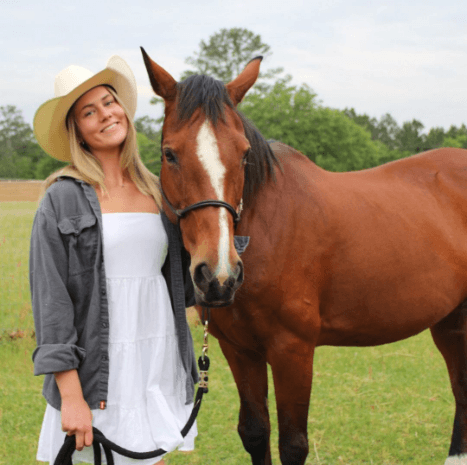Averie Douglass, a longtime rider and admirer of horses, took a break from the pastime during college. After trying competitive riding, she found she didn’t have a passion for it, but after a short hiatus, she was ready to get back in the saddle.
“I asked myself, ‘Why did I ever stop?’ I’ve always felt something special around horses, but after trying competition, I decided I just wanted to go to a farm and be in the presence of animals,” says Douglass (’24 master’s, social work).
She started taking riding lessons again, and around the same time, she began researching graduate programs. With a psychology major from a university in North Carolina, Douglass was drawn to the flexibility and opportunities that come with a master’s degree in social work from counseling and clinical work to program development and advocacy.
“When you’re applying, it’s such a learning experience because you’re writing personal statements and essays about what your goals and your niche are,” she says.
As she submitted applications, Douglass pulled from her personal affinity for horses and an undergraduate internship in therapeutic riding to write about her interest in alternative approaches to well-being such as equine-assisted services. Even though she applied to multiple schools, the University of South Carolina is the only one she visited. She fell in love with the campus and atmosphere. When she was accepted into USC’s MSW program, “it was an easy choice to make,” she says. “Something just made sense about being here, and it has been the best decision.”

At USC, she was able to nurture her interest in equine-assisted services through a field placement she pursued and helped design in partnership with the College of Social Work and Hickory Top Horse Farm in Eastover, South Carolina. In addition to observing therapy for program participants by shadowing executive director Amanda Malanuk, Douglass also participated in horse care, learned about the mechanics of running a farm and researched equine-assisted therapy and therapeutic riding to prepare presentations for volunteers.
She observed participants of all ages – older groups in memory care and younger children or teens with conditions such as cerebral palsy or autism. As part of her learning process, Douglass and Malanuk would meet after a session to assess and ask questions. She admired how interacting with the horses had a calming effect on the participants.
“With dementia, we see a lot of anxiety and depression. Interaction with the animal would often improve their mood whether they were facing a fear or remembering that they had ridden horses when they were younger,” Douglass says. “With memory care, it’s really important to engage people. One of our memory care clients said it was the most exciting day of her life.”
For other participants, getting to know the horses became a confidence-builder from their initial contact when they might just let the horse sniff their hand until building up to brushing and eventually leading the horse through a planned course. For participants such as a middle schooler with cerebral palsy, equine-assisted services was combined with occupational or physical therapy, and the program offered equine-assisted learning for children with learning disabilities, such as dyslexia.
Before starting a job in August in Charleston, Douglass will participate in training to become certified in equine-assisted therapy and learning. As a mental health professional, she will be paired with an equine specialist at Lowcountry Equine-Assisted Psychotherapy (LEAP). Unlike Hickory Top where she did her field placement, there is no therapeutic riding at LEAP. During a session, the client may touch or interact with the horse. As equine-assisted services grow in popularity, LEAP is looking to expand its staff to assist more clients as well as continue a partnership with the VA to assist military populations.
“I’m excited about facilitating the horse-human connection,” Douglass says. “For people who have never seen a horse or been on farm or for those who have but don’t know the capabilities horses have for healing, I want to be the person who can connect someone to that new experience.”
She credits USC and the College of Social Work in preparing her for her dream job: “The College of Social Work was so supportive in allowing and helping me establish the partnership with Hickory Top. It really reinforced the idea of if there's if something doesn't fit, go find something that does. And I couldn't have gotten through grad school without the community I built. Having that network is going to help me be successful. We don't do social work alone.”